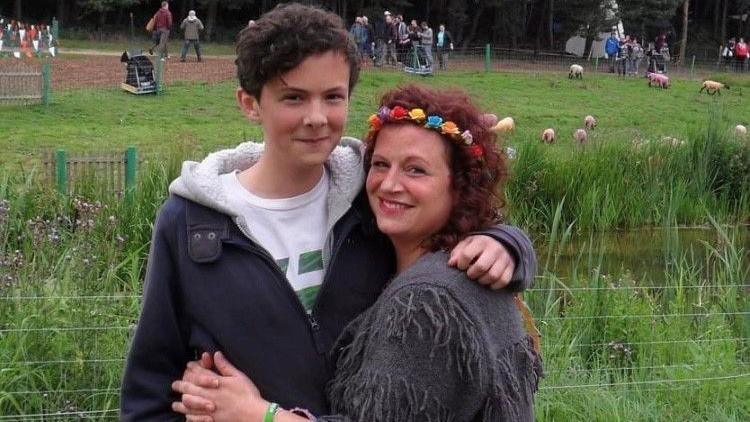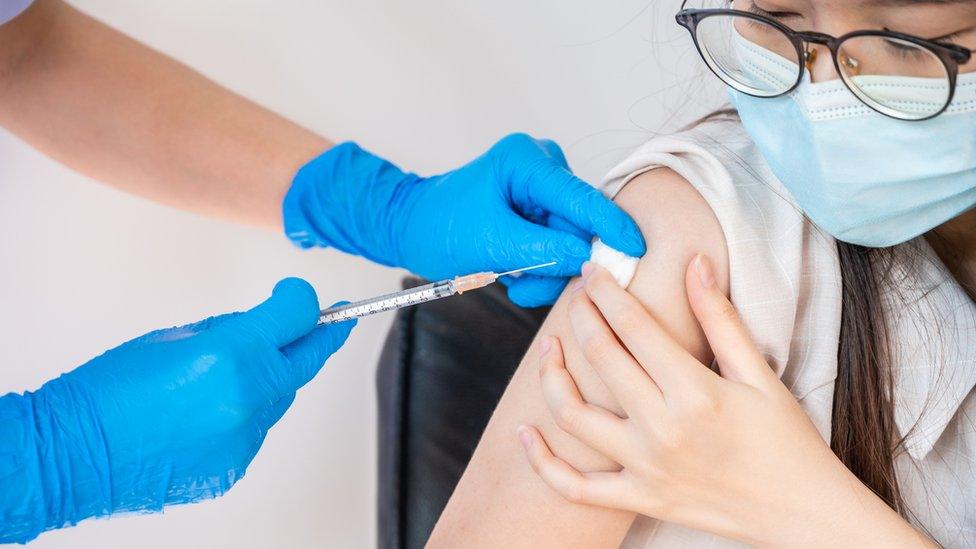Mum's meningitis warning 10 years after son dies

Jo Towler with her son Ollie Towler-Jones who collapsed while at the Latitude festival and died from meningitis
- Published
A mother whose son collapsed and died from meningitis during a festival is urging teenagers to get fully vaccinated and be aware of the infection's symptoms.
Ollie Towler-Jones was at Latitude in Henham Park, Suffolk, when he became ill. He was airlifted to hospital after he went into organ failure.
His mother, Jo Towler, from Norwich, said her son, who was 18, had been sleeping off what he thought was a hangover when he lost all feeling in his legs and turned a greyish-purple colour.
Latitude, which takes place at the weekend, dedicated a part of the site as "Ollie's Walkway" and Ms Taylor and her husband, Marc, will be there to highlight their son's story on what will be the 10th anniversary of his death.

Ollie Towler-Jones had been attending Latitude every year from the age of 10
Meningitis is an infection of the lining of the brain and can be life-threatening unless diagnosed and treated early.
The symptoms can be similar to other illnesses, making it hard to diagnose.
A few days before he went to Latitude, Ollie had returned from a holiday abroad.
The teenager had developed a cough and said others in his holiday group had throat infections.

Ollie was treated by medical staff at the festival before being taken to hospital by air ambulance in July 2014
During the festival, Ollie and his friends had been drinking, said Ms Towler.
They later told her he just put feeling unwell down to "a really dodgy hangover".
She understands he had vomited and had a headache and had decided to sleep it off.
But he was discovered in his tent a few hours later unable to move his legs.
Ms Towler, who was also at the festival but camping elsewhere, managed to get to the medical tent and speak to her son before he was flown to hospital, but his deterioration was rapid.
"He must have been petrified. He was just a typical teenager, starting life, and looking to have some fun. He loved Latitude."
By the time he reached hospital, "all his organs had failed, he had tubes coming out of all sorts of places," she said.
"They put him in a coma to let his body relax and try to respond to the antibiotics."
Ollie's heart stopped and medics at the Norfolk and Norwich Hospital tried to resuscitate him, but he died two hours after being taken to the unit.

Latitude created Ollie's Walkway ten years ago, following the teen's death from meningitis
Ollie died of bacterial meningitis and sepsis. He was vaccinated as a baby, but not as a teenager.
A year after he died, the MenACWY vaccine was introduced routinely for teenagers, aged 13 or 14.
It protects against four strains of meningitis and young people can also be vaccinated, up to age 25, from a GP.
"I just don't want anyone else to ever have to go through what Ollie went through," said Ms Towler of her only child.

The MenACWY vaccine helps protect against life-threatening illnesses like meningitis and sepsis.
According to Meningitis Now’s, external chief executive Dr Tom Nutt, meningitis can affect anyone, at any age.
"Teenagers and young people like Ollie are at an increased risk," he said.
"This is because they are more likely to be carrying the bacteria that cause meningitis in the back of their nose and throats.
“Vaccines are available to prevent some types of meningitis and most of these are available as part of the UK routine immunisation schedule.
"However, not all types of meningitis can be prevented by these vaccines and there is no vaccine to protect against all causes of meningitis."
The organisation found although cases had fallen during the past decade, it was now seeing reported cases rising again.
Early symptoms in teenagers can include, fever, headache, vomiting, diarrhoea, muscle pain, stomach cramps, fever with cold hands and feet.
Other common indicators include pale, blotchy skin. It can be difficult to spot it on darker skin so keep an eye on the palms, the soles of the feet or other paler areas.
The glass test, external can help reveal a rash that does not fade under pressure.
Get in touch
Do you have a story suggestion for Norfolk?
Follow Norfolk news on BBC Sounds, Facebook, external, Instagram, external and X, external.
Related topics
More related stories
- Published24 April 2023

- Published21 July 2024
